Decide
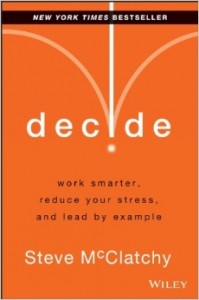 I read many time-management and life-management books, as I am always looking for new insights into how to become more effective with my time and life. I found some helpful ones in Decide.
I read many time-management and life-management books, as I am always looking for new insights into how to become more effective with my time and life. I found some helpful ones in Decide. I read many time-management and life-management books, as I am always looking for new insights into how to become more effective with my time and life. I found some helpful ones in Decide.
I read many time-management and life-management books, as I am always looking for new insights into how to become more effective with my time and life. I found some helpful ones in Decide. In Simplify, Bill Hybels puts his finger squarely on the things that complicate our lives. I found the book insightful and helpful.
In Simplify, Bill Hybels puts his finger squarely on the things that complicate our lives. I found the book insightful and helpful.
In particular, I loved his point that, “If you choose to live with more energy reserves in your life, you will, without a doubt, disappoint some people.” That is so true! And understanding and embracing that truth is what allows us to move forward. Living with more energy actually takes work, discipline, and time. It takes time to get enough sleep; it takes time to exercise; it takes time to do the things that replenish us.
And that means less time for other things—things that people will think are important. I’ve seen people be accused of being selfish or being uncommitted to Christ because they chose to live with more energy. (That is really just people trying to manipulate others into doing what they want them to do.) But living with more energy reserves has tremendous benefits. The quality of your work, and your overall life, improves. You have the ability to stay in the game longer, rather than burning out and having to take a longer time out to recover. And over time, your productivity increases. It’s worth it to take the time to live with more energy.
I also thought it was insightful to recognize that when we do get depleted, it is natural for us to look around for someone else to fill us up. When you’re depleted, you lack energy, and it takes more energy to make the choices needed to get filled up again. But at the end of the day, it is our responsibility—and only ours—to fill our tank or to plug the leaks. It’s actually a setup for resentment when we look for others to do the things we need to do for ourselves.
When I think of simplifying, I usually think in terms of eliminating clutter or shortening my to-do list somehow. But Hybels brings in another angle that is significant: identifying and addressing the things that complicate our lives.
When our finances or relationships are not in order (for example), it complicates our lives. The fear and worry, and the time it takes to deal with those types of things, can suck the life right out of us. It takes time to put things right and time to keep them in order, but the peace it brings into every area of our lives is worth it. There is an energizing freedom that comes when we aren’t worrying or stressing about those areas.
I think Hybels hits the nail on the head when he says that it is more about what kind of person we want to be than what we want to get done. That helps us focus on the things that are most important, which will have the biggest impact over time. Simplifying life with this framework in mind is a powerful paradigm for a more peaceful and more productive life.
What are your thoughts, questions and insights?
I was quite surprised at how many ideas in Insanely Simple apply to the church. Who would have guessed that the church could learn a lot f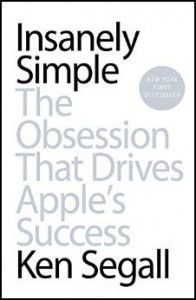 rom Apple and Steve Jobs? Ken Segall does a great job of looking at the power of Apple’s commitment to Simplicity and the very real challenges and benefits of trying to live out that commitment.
rom Apple and Steve Jobs? Ken Segall does a great job of looking at the power of Apple’s commitment to Simplicity and the very real challenges and benefits of trying to live out that commitment.
Almost every chapter had solid take-aways for anyone leading a church or ministry. I’ll focus on a couple that really stood out to me.
I loved this quote regarding why Apple doesn’t multiply products like so many other companies:
“They seem to forget that trying to please everyone is a good way to please no one. Choosing the path of Simplicity, Apple elects to do just a few things but do them incredibly well.”
How different from the way so many of our churches operate. We often add program after program after program until we have more things going than we can keep track of, much less actually staff effectively. Our motives are usually good—we see real needs and want to meet them. But the reality is that no church can do everything. It’s better to do a few things well than a lot of things in a poor or mediocre way.
Our inability to say no to new programs or ideas is one reason so many pastors and leaders suffer burnout and why so many volunteers follow our lead. Most volunteers in church can give one time slot per week to the church—one evening, one weekend afternoon, etc. When we let programs proliferate, we often end up putting pressure on people to do more (because we have to keep the programs going). Our most committed people will often step up, but in the long run, they too will burn out, get resentful, or just disappear, because they can’t maintain that pace. In the worst cases, it becomes almost abusive, and people feel used and uncared for. Ironically, it can be very unloving to say yes to every ministry opportunity, because of what it costs our volunteers.
I also noted his comments on how Apple communicates. He used their marketing as an example, but it applies to their internal communication as well. For me, the application to our preaching and teaching in the church was obvious. Segall said:
“Apple didn’t describe the original iPod as a 6.5-ounce music player with a five-gigabyte drive. It simply said, ‘1,000 songs in your pocket.’ This is the way human beings communicate, so this is the way Apple communicates.”
While that sounds so obvious, I think it’s actually pretty hard. It takes work and a real commitment. It reminds me of some Olympic figure skaters or gymnasts—they often make what they are doing look effortless. The truth is that it takes an incredible amount of work to make things look so easy!
The same is true for our teaching. It’s easy to fall into using jargon—language that most people never use outside of Sunday mornings. It takes work to communicate biblical truths in ways people can understand. It’s easy to speak in ways that communicate only with people’s minds and never touch their hearts; it takes work to go beyond that and find the right story, the right illustration, or the right words to go deeper.
Besides helping people understand what we are saying on a deeper level, we are also equipping them to talk to others. If we use language on Sundays that they don’t use on Mondays, they either won’t tell others what they are learning or they won’t know how to communicate it effectively. But if we are speaking their language, they will be able to talk to others. It will be much more natural and more common.
I think our churches have a bias toward being more complex than is helpful or needed. Simplifying what we are doing has multiple benefits beyond the few I mentioned. Who would have guessed that the church can learn from Apple? I certainly have!
What has been your experience in this area of complexity and simplicity? Have you tried to simplify what you’re doing? How did it go? I would love to hear your thoughts.
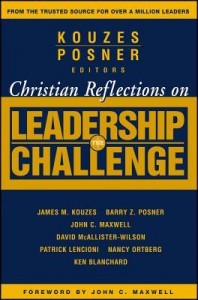 Kouzes and Posner continue to be two of my favorite authors when it comes to leadership. Their insights and clarity never cease to encourage and instruct me.
Kouzes and Posner continue to be two of my favorite authors when it comes to leadership. Their insights and clarity never cease to encourage and instruct me.
Going through this book, I was struck by the overall framework of the five practices of exemplary leadership:
Practice 1: Leaders Model the Way
Practice 2: Leaders Inspire a Shared Vision
Practice 3: Leaders Challenge the Process
Practice 4: Leaders Enable Others to Act
Practice 5: Leaders Encourage the Heart
It’s simple, clear, and concise, but it summarizes what others spend hundreds of pages on. As I have reflected on it, I think this is a great way to train people in leadership. I’m always looking for tools to use. This book gives a simple framework that is easy for people to understand and can easily be used to train people in the essentials of good leadership. It lays out an observable set of skills and abilities that are useful no matter where you are. And leadership, like any other skill, can be strengthened, honed, and enhanced, given the motivation and desire, the practice and feedback, and the proper role models and coaching.
It’s all too easy to limit leadership to a select few who we deem have high potential. How much more effective would it be to teach leadership to all our people and see who grabs ahold of it? I know I have been surprised at times by which people in a group ended up being the best leaders; first impressions aren’t always correct!
I’m curious. What have you used to teach your people leadership? Anything in particular that has been helpful or particularly effective?
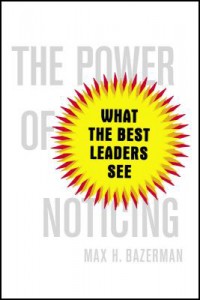 What’s in front of you is rarely all there is. Developing the tendency to ask questions like “What do I wish I knew?” and “What additional information would help inform my decision?” can make all the difference. It can make you a far better decision maker, and it can even save lives. Learning to notice the things that aren’t immediately obvious is an important skill that can be developed.
What’s in front of you is rarely all there is. Developing the tendency to ask questions like “What do I wish I knew?” and “What additional information would help inform my decision?” can make all the difference. It can make you a far better decision maker, and it can even save lives. Learning to notice the things that aren’t immediately obvious is an important skill that can be developed.
Understanding what is at work when we fail to notice is crucial to understanding how we can learn to pay attention to what we’re missing. This book promises to provide you with exactly this understanding and a blueprint for noticing for the rest of your life.
If we are motivated to turn a blind eye to what someone says or does, we are far less likely to see that person’s immoral behavior. The term motivated blindness describes one’s systematic failure to notice others’ unethical behavior when it is not in one’s best interest to do so. Simply put, if you have an incentive to view someone positively, it will be difficult for you to assess the ethicality of that person’s behavior accurately. In many cases, what you see isn’t all there is, because you have reasons to decide it isn’t even there.
Motivated blindness is not inevitable; it is, in fact, surmountable. The evidence of countless whistle-blowers speaks to this fact. Effective decision-making, and consequently effective leadership, can hinge on overcoming motivational blindness. But how can we do so? First, we can learn to notice the facts around us more fully. Second, we can make decisions to notice and act when it is appropriate to do so. Third, we can create clear consequences for leaders when they fail to act on facts that indicate unethical behavior. Fourth, leaders can provide incentives to speak up for decision makers throughout their organization.
Plenty of people don’t notice conflicts of interest. When someone tells you, “This is just how it’s done in our field,” that should prompt you to ask why it is done that way and whether there is a better way to do it. Too often, in industry, we offer, as a reasonable explanation, that an action is “commonplace,” even when it is clear that what is accepted practice is not necessarily correct or appropriate. The fact that the behavior is common normalizes it, but it doesn’t certify that the behavior is the right thing in do. And when we fail to oppose unethical behavior, we, too, become part of the problem.
We know how to make logical decisions: define your objectives, identify the multiple criteria that you are trying to achieve, weight the criteria, identify options, and analyze the best choice. Of course, there are lots of variations of these kinds of logical processes. Those who want to misdirect us do not want us to be so logical. They want to hijack our thinking and manipulate us to do what they want. When you start to stray from logic, and another person is involved, whether she is a negotiator, marketer, or politician, it is time to put yourself in her shoes, understand her motives, and adapt accordingly. Whenever we interact with people and we do not believe they have our best interests in mind, we need to look beyond the information they put in front of us and think about what they are trying to get us to do and how we can get the information we actually need. When our goal simply becomes to notice, we can avoid the misdirection of magicians and others who borrow from their craft.
Most people tend to be overconfident, and some experts have argued that overconfidence is the most important of all decision-making biases. Because overconfidence can prevent us from noticing the downside to our actions, it can trigger wars that never should have been started. Overconfidence may explain the high rates of corporate mergers and acquisitions, despite the fact that they so often fail. Similarly, overconfidence could prompt an executive to believe that her firm’s excellent performance in the next period will conceal the current period’s negative results—and steer her onto the slippery slope of unethical behavior.
The evidence should motivate you to stop and engage your more methodical mode of thinking before escalating your commitment to a strategy that is not working out. Not only should you audit your behavior to make sure that continuation makes sense, but you should also monitor your behavior to make sure you aren’t headed down a psychological slippery slope that will result in unethical behavior that you would never have thought you’d condone. Too often executives engage in unacceptable behavior not because they originally intended to defraud but simply to justify the mess that they got into.
Thinking one step ahead allows you to identify when to be trusting and when to be cynical. It is wise to think carefully about the decisions and motives of the other party so that you can understand what a problem looks like from his or her perspective. Thinking ahead may help you identify when reasons to trust exist and when you have justification to be cynical. While it doesn’t make sense to be cynical simply because you are dealing with a person rather than a machine, we should not necessarily trust all individuals in all contexts. In some situations, it costs little or nothing to collect additional information to test our intuition, but we often fail to do so. Your goal should be to understand the strategic behavior of others without destroying opportunities for trust building.
I hope that, after reading this far, you are well on your way to becoming a first-class noticer. First-class noticers, however, are more consistent. Even when failures occur, they focus on what they did and, more important, on what they could do differently in the future. As a result, they avoid repeating their mistakes. Focusing on self-improvement allows us to learn from experience and develop the tendencies needed to become first-class noticers.
Employees often have the analytic ability to notice, but their organization’s culture or incentive system prevents them from using it. Leaders have a unique responsibility to create systems that will increase the likelihood that their staff will notice important information and respond in a productive manner. Leaders should audit their organizations for features that get in the way of noticing. It is often the first step toward identifying what needs to change to create an organization filled with first-class noticers.
The Power of Noticing also challenges leaders to be noticing architects. Leaders too often fail to notice that they have designed systems that encourage a misspecified goal (such as recorded sales) rather than a more appropriate one (actual profit to the organization). I encourage all leaders to become better noticing architects and to design systems that encourage employees to notice what is truly important.
As I hope you have learned by now, focusing is important, but sometimes noticing is better —at least when you are making critical decisions. I hope that this book has provided useful guidance to help you, as a focuser, also become a first-class noticer.
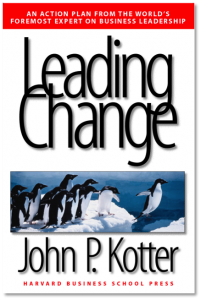 Every leader is leading change; it’s integral to the job. Knowing how to do it, and do it well, is probably one of the most important skills any leader can have. But in my experience it is also one of the most difficult things a leader has to do. You would think that eventually we would get it figured out. That’s where books like Leading Change are so helpful.
Every leader is leading change; it’s integral to the job. Knowing how to do it, and do it well, is probably one of the most important skills any leader can have. But in my experience it is also one of the most difficult things a leader has to do. You would think that eventually we would get it figured out. That’s where books like Leading Change are so helpful.
In my experience, “establishing urgency” and “developing a vision,” while distinct, are intimately linked and essential for any effective change effort-at least a change effort of any significant magnitude.
Without establishing a sense of urgency there is seldom real forward movement. Urgency is all about communicating why the change needs to be made now; without that, people don’t move forward. The change effort takes a back seat to everything else that calls for attention. And there are always plenty of things calling for attention. Many leaders have been frustrated for just this reason. Their people agree that the changes would be beneficial, but nothing happens because people don’t have a sense of urgency.
Vision is connected. In a sense, vision is about the “what” while urgency is about the “why,” or more accurately, the “why now.” Vision describes the future reality; I love Kotter’s point that having an ineffective vision is worse than having none at all. That really struck me. An effective vision is going to resonate with people. I wonder if we sometimes rush the process because we know we need to have a vision with the result that we settle for one
that doesn’t have the impact it could. It takes time and work to establish an effective vision; we dare not shortcut the process if we want to lead change well.
I’ve also become a huge believer in the importance of getting short-term wins. It’s hard to overestimate the impact on morale and the energy that is released when people see positive results or real progress. In leading any change effort I think leaders should identify potential short-term wins and be very intentional about reaching, and then celebrating, those wins. Few things will have a bigger impact on the actual progress made.
What’s your take-away? What has been your experience leading change, for better or for worse?
Interestingly, I read this book right after reading an article in Inc. Magazine titled, “Listening to Complainers Is Bad for Your Brain.” Listening to negative comments actually affects your hippocampus, the part of your brain that is involved in problem solving. As one friend said, too much complaining turns your brain to mush. Attitude matters.
I was particularly struck by Maxwell’s comments on how important attitude is at the beginning of a project: “All’s well that begins well.” I’ve often challenged people to start strong when they are pursuing the goals they have set; I haven’t always made the connection explicitly with choosing our attitude at the same time. I think I’m going to adapt my challenge.
I’m still thinking about the underlying theme, that we can choose our attitude. Generally I believe that, but I’m wondering what, if any, limits there are on that. I suspect Victor Frankl would suggest that there aren’t. But I’ve seen many people over the years who seemed to try sincerely to change their attitudes and weren’t able to or didn’t seem to be able to maintain it. Is that they didn’t really try, or was there a limit they really couldn’t get past?
What do you think? Any other thoughts on Maxwell’s book?
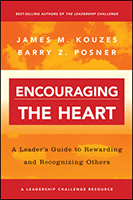 The importance of leaders who are able to encourage their people’s hearts is unequivocal. Few things are more important or more powerful than the ability to do that.
The importance of leaders who are able to encourage their people’s hearts is unequivocal. Few things are more important or more powerful than the ability to do that.
A couple of things stood out to me as I read Encouraging the Heart. The first was the idea that the best leaders actually want to be liked. Not caring what others think, including not caring about the opinions of those who follow us, is actually an attitude for losers and leads to less effectiveness. I think that idea is counter-intuitive for most leaders.
Often leaders shy away from the idea of wanting to be liked. It seems connected to the idea of pandering or people-pleasing. It implies making decisions to be or become more popular. And in the worst case, that is exactly what it is, often rooted in our own insecurities. However, it doesn’t have to be that way.
People will work harder for leaders they like, give them the benefit of the doubt when questions arise, and be more likely to support their new initiatives. Wise, healthy leaders know that and want to be liked. Rather than pursuing that by pandering in some way, they will work at being good leaders—leaders who encourage people to be the best they can be, who hold high standards, give good feedback, and help people succeed. Those kinds of leaders will be liked and reap the benefits of the people’s affections.
The other thing that struck me was an old truth—that people don’t follow good leadership techniques, they follow the person. The best leaders know that and focus energy on finding their own voices, so they will be authentic rather than just echoes of someone else. People spot fakes; they can spot people who aren’t real, who aren’t authentic. It’s ironic, really, because many people who want to be effective leaders put a great deal of time and effort into developing their leadership skills. And although I think that’s a good thing, it’s not as important as living our beliefs in ways that others want to emulate. In these times, especially, people are looking for leaders they can respect, trust, and look up to. That doesn’t come from technique; it comes from character and integrity.


